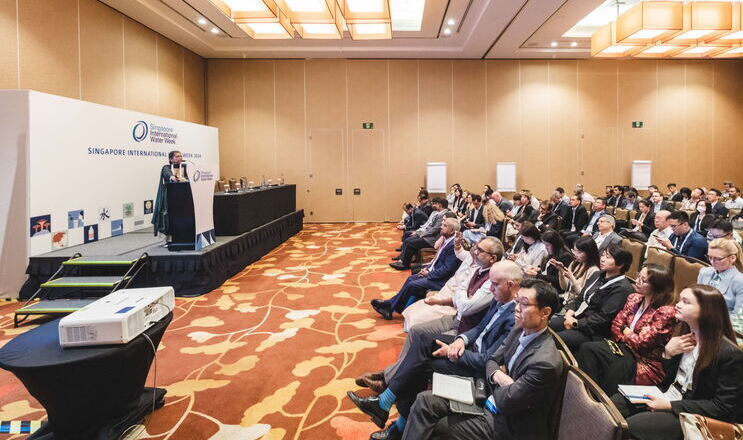Home >
Landing Page >
Spotlight 2025 >
Programme >
In-Focus Forum
In-Focus Forum
TUESDAY, 24 JUNE 2025
2:00 PM – 5:30 PM
Singapore EXPO Meeting Rooms
ROOM 1
|
The In-Focus Forum showcases successful case studies and innovative solutions from industry to help cities build greater resilience against floods and extreme weather events. Dr. Piers Clark, Founder and Director of Isle Group, will moderate the forum featuring eight case studies that explore key areas including master planning, digital tools, flood mitigation operations, and blue-green infrastructure.
|

|
For more detailed programme, please visit here.
Case Study: Sibu Cloudburst Project
The State Government of Sarawak is prioritizing urban transformation in several cities to improve living conditions for their residents, reduce significant flood risk, formalize future growth, risk, and unlock the area’s potential for eco-tourism, education, and recreation – all while preserving its biodiversity, natural resources and building resilience.
Ramboll has been engaged by the Land Custody and Development Authority to develop robust masterplans in the cities of Sibu and Kuching. The masterplans are developed with water, climate, and local people at the center and as the main guiding principles. These principles were derived following engagement and close liaison with key stakeholders. Locality level masterplans, which will include Urban zonings, land use, a catalogue of blue-green water management solutions and technical designs for critical infrastructure are being developed.
Learning points:
Participants will be able to gain knowledge on Sarawak’s overall plan for city resilience planning and their ambition to reduce and manage flood risks by unlocking future growth potential. Importance of stakeholder engagement and participation during the development and endorsement of these masterplans will also be highlighted.
 Christian Nyerup Nielsen
Global Director,
Ramboll  |
 YBhg. Datu Sr. Zaidi Haji Mahdi
Director,
LCDA  |
Moderator:
 Piers Clark
Founder and Director of
Isle Group  |
Case Study: Flood Mitigation in Metro Manila and the Chao Phraya Basin: From Master Planning to Implementation Strategies
Case Study: Philippines - Metro Manila Flood Management
Focus on the need for an adaptive flood master plan in Metro Manila, combining structural solutions like dams with non-structural measures like watershed conservation. These efforts address the immense flood management challenges in Metro Manila, a megacity of 13 million people, worsened by 2.5 million informal settlers in flood-prone zones. On average, 20 typhoons strike annually, with 5 to 7 being destructive, like Typhoon Carina in 2024, which caused PHP 1.17 billion in agricultural losses. The Metro Manila Flood Management Project Phase-1 aims to modernize 36 pumping stations, build 4 new ones, and improve solid waste management to address drainage blockages. Resettlement of 600 informal settler families is ongoing, with accessibility and livelihood issues persisting.
Learning points:
- Adaptive flood management in megacities benefits from combining structural measures (e.g., dams and pumping stations) with non-structural approaches (e.g., watershed conservation, solid waste reduction) to tackle frequent and severe natural disasters like typhoons.
- Addressing informal settlements through resettlement, alongside infrastructure improvements, is critical but must prioritize accessibility and livelihoods to mitigate social and economic disruptions.
Case study: Thailand - Chao Phraya Flood Management Program
The World Bank is supporting Thailand in preparation of the first phase (“Plan 1”) of the multi-pronged, 9-phase Chao Phraya flood management program. The program, (with a total cost of more than US$ 10 billion) aims at decreasing flood risk and enhancing climate resilience in the Chao Phraya basin, which accounts for 40% of Thailand’s population and two-thirds of its GDP. The Plan 1 investments will increase the flood routing capacity through upgrading and modifications of the existing irrigation canal system in the lower-east part of the basin. The design of the program presents complex challenges linked to the management of fluvial flooding, urban drainage and land use, inter-agency coordination, and presence of informal settlements along the canals.
Learning points:
- Comprehensive flood management requires integrating large-scale infrastructure upgrades, such as enhancing canal systems, with strategic planning to address complex challenges like urban drainage, land use, and inter-agency coordination.
- Effective climate resilience programs must balance technical solutions with social considerations, such as managing informal settlements, to ensure sustainable flood risk reduction in economically vital regions.
 Georges Comair
Senior Water Resources Specialist,
World Bank  |
 Atty. Romando S Artes
Chairman,
Metropolitan Manila Development Authority  |
 TBC
Royal Irrigation Department
 |
 TBC
Department of Public Works and Highways
 |
Moderator:
 Piers Clark
Founder and Director of
Isle Group  |
Case Study: Improving City Resilience with an Integrated Water Approach
Greater Manchester is connected by water but how it is managed is highly fragmented and issues frequently arise when there is too much water (flooding), too little (droughts) or it is too dirty (polluted waterways). As a result, Greater Manchester Combined Authority (GMCA), supported by Jacobs, developed a silo-breaking partnership and The Greater Manchester Integrated Water Management Plan (IWMP), which is an industry-defining, integrated framework that will deliver more value, wider benefits and more sustainable outcomes.
The IWMP creates a new framework for collaboratively addressing the major challenges impacting the water environment, moving away from a siloed business-as-usual, multi-organizational delivery to a more integrated and ambitious partnership approach. With appropriate engagement and funding, that delivers more value, wider benefits and more sustainable outcomes in the longer term.
Through mapping and analysis, key areas with intersecting water and community needs were identified to be considered for co-planning, design, funding and delivery. Plan formulation followed a co-design process which truly empowered the partner agencies and the wide range of stakeholders to drive the plan priorities and outcomes with a ‘Place-based’ focus. A series of workshops and co-location provided a venue for open and honest discussion of priorities, opportunities and challenges. The ultimate benefits go beyond flood protection and water quality — they include social value, biodiversity net gains and improvements to ecosystem services.
An Integrated Investment Plan identifies ways to leverage additional funding, creating a Value-Add Framework that quantifies and qualifies the additional value unlocked by working in partnership. The final Plan sets out an industry-defining, integrated delivery framework that will deliver more value, wider benefits and more sustainable outcomes through a whole-system transformation of structures, tools, culture, power dynamics and policies enabled by active collaboration and shared goals.
Learning points:
- Integrated Catchment Management as a framework to deliver city scale environmental (including flood) improvements.
- Collaborative partnership working to address complex, interconnected water challenges.
- Trust and leadership are fundamental ingredients to successful collaborative partnerships, transforming structures, mindsets and policies for the better.
- Cross-sector working, bringing together all City functions to use the lens of Water to drive integrated working and improved community outcomes.
- Place-based planning facilitates multi-stakeholder collaboration to address flooding and water quality issues in a holistic manner.
- Water needs and issues can be a connector to drive wider environmental and social improvements for cities.
 Adam Hosking
Jacobs Global Solutions Director,
Resilience and Climate Response  |
 Sarah Jenner
Head of Catchment Planning,
Conservation and Partnerships, United Utilities  |
Moderator:
 Piers Clark
Founder and Director of
Isle Group  |
Case Study: Valencia’s Early Detection and Flood Operations
Speakers:
Moderator:
 Prof Enrique Cabrera Rochera
Spanish Experts Committee for the Reconstruction after the Valencia Floods,
Valencia, Spain  |
 TBC
Global Omnium
 |
Moderator:
 Piers Clark
Founder and Director of
Isle Group  |
Case Study: Melbourne Water Sensitive Urban Design
Speakers:
Moderator:
 TBC
Arup
 |
 Cintia Dotto
Water Sensitive City Lead, Melbourne
 |
Moderator:
 Piers Clark
Founder and Director of
Isle Group  |